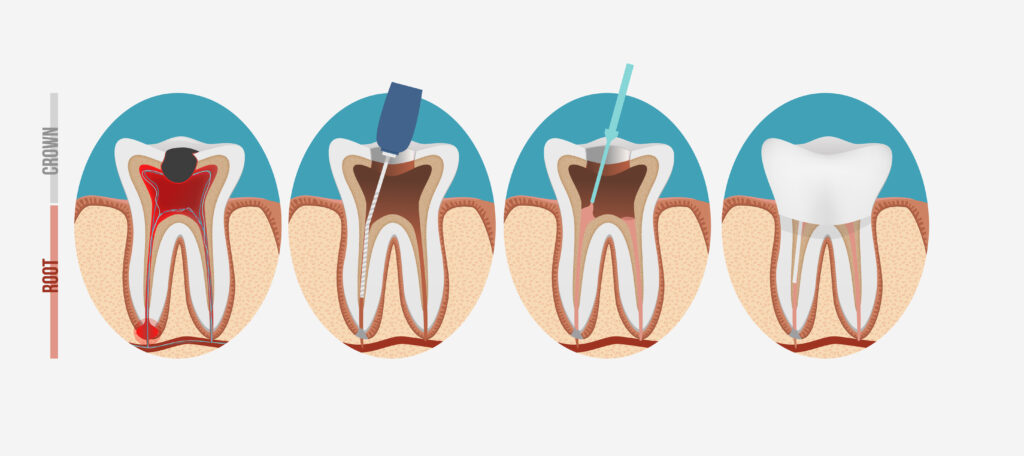zA root canal may not be the ideal dental procedure, but it is occasionally essential. It may be necessary when a cavity is too deep and has reached the tooth’s nerve. If a break in a tooth spreads into the nerve, it may also require a root canal. You must address one of these problems immediately to avoid a painful toothache.
How Do Root Canals Work?
The tooth’s nerve is reached during a root canal procedure, which involves opening the tooth’s crown. The endodontist or dentist delicately removes the nerve from the tooth using specialized equipment. The tooth is rebuilt with a crown or filling, and the empty nerve area is filled with a dental substance. The tooth may be uncomfortable for a few days following the procedure, but most patients have instant relief from their toothache. The therapy is meant to clean out the infected root canal, stop the tooth from becoming reinfected, and preserve the original tooth.
What takes place during root canal therapy? Discover more about this simple, painless technique that can reduce discomfort and preserve your natural tooth.
You shouldn’t be concerned if your dentist or endodontist recommends an operation to treat a decayed or damaged tooth. This care method relieves discomfort and restores the health of millions of teeth each year.
A soft tissue called pulp may be found inside your tooth, underneath the white enamel, and a hard layer called dentin. Blood veins, nerves, and connective tissue are all present in this tissue, aiding the growth of the tooth’s root. Because the tooth is still fed by the tissues around it, a fully grown tooth can live without the pulp.
The traditional sayings have nothing to do with a contemporary root canal procedure! Depending on the state of your tooth and your unique circumstances, it may often be finished in one or two sessions and is comparable to a standard filling. A root canal is incredibly effective and not too painful. You’ll be grinning, biting, and eating easily in no time.
There are several benefits to saving the natural tooth with root canal therapy:
Reliable chewing
Normal biting pressure and feeling
A genuine appearance
It prevents undue wear or pressure on other teeth
How Long Does a Root Canal Last
You cannot predict the lifespan of a root-canalled tooth with a specific number. Root canal therapy is frequently used as a last resort to save a tooth damaged by disease or an accident. It should ideally last as long as a crown. Regular dental visits should allow your dentist to see any potential problems with a root-canalled tooth early on. Maintaining good dental hygiene at home, which includes brushing and flossing, may support the durability of the root canal and height.

Should I Visit a Specialist?
Your family dentist can do root canals. But occasionally, your dentist may need to refer you to a specialist (an endodontist). The majority of the time, your family dentist is capable and proficient at doing root canals. Then, you won’t require a specialist to have them take care of your discomfort. Sometimes, roots are difficult to reach because they have unusual forms, additional canals, or have already calcified. There’s nothing to be terrified of with an expert! Every day they finish root canals all day long.
You may assist in maintaining or enhancing your oral health and possibly avert a root canal by going to the dentist for routine exams. If you require a root canal, Choules Family Dentistry has the expertise and tools to help you feel better quickly.







